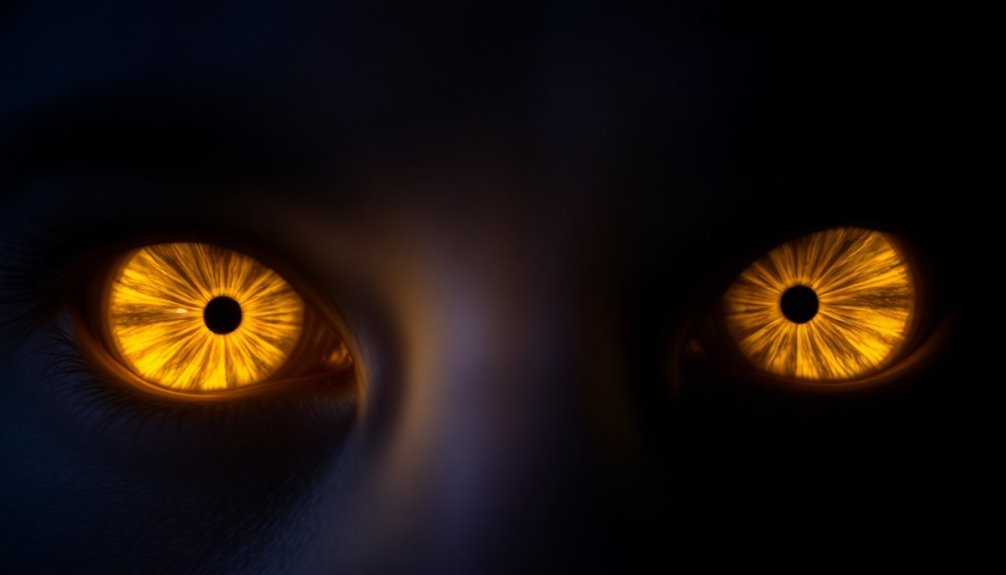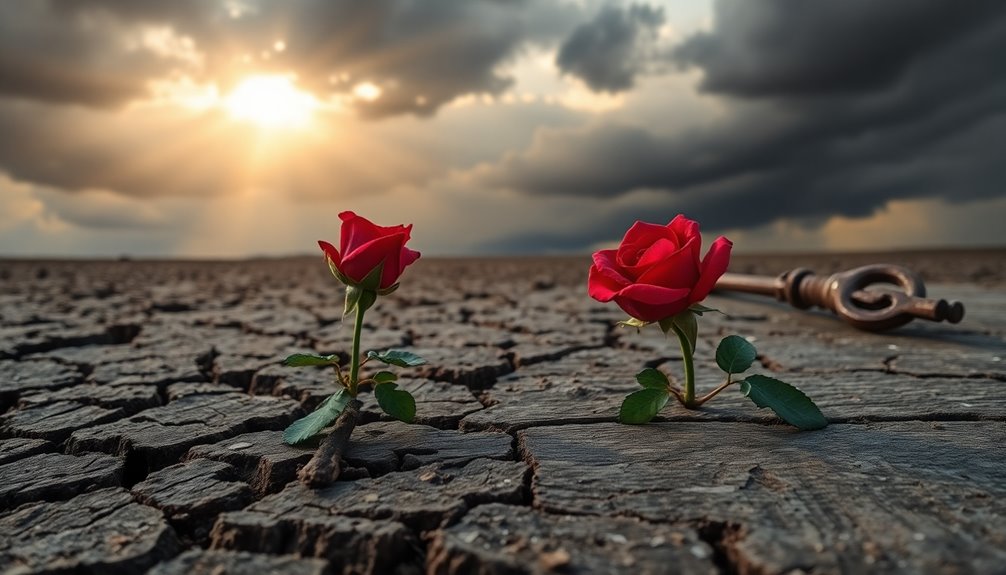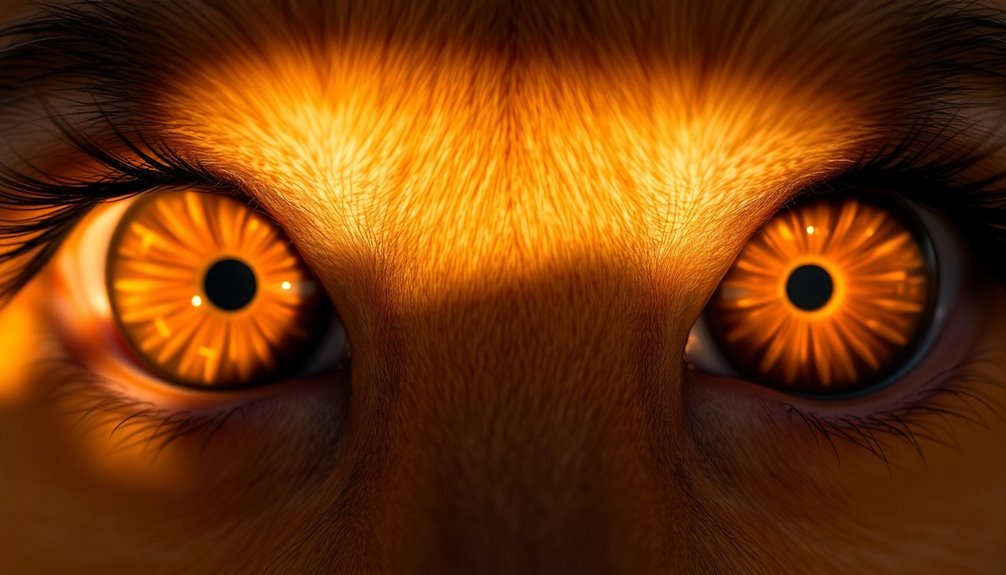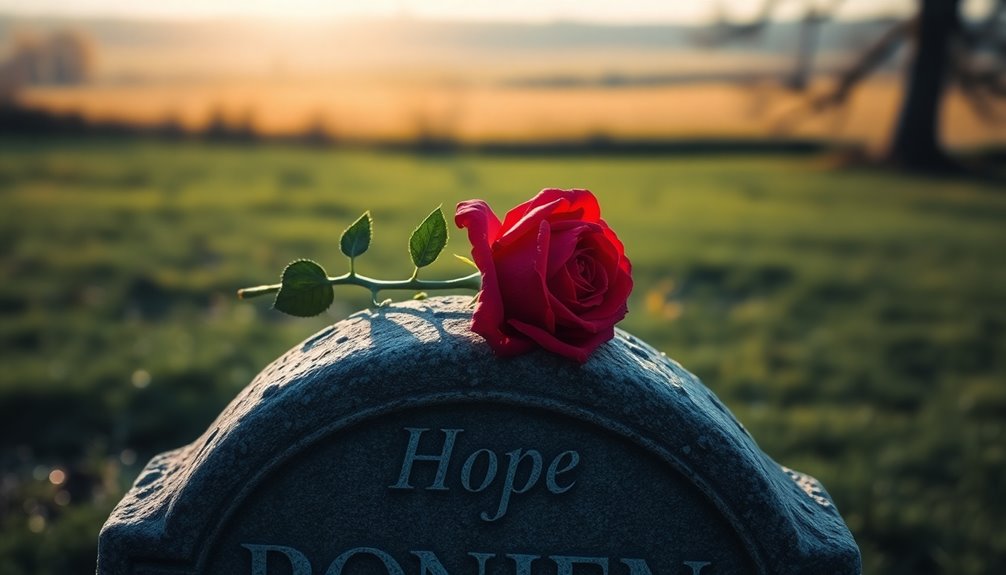Yellow eyes hold deep spiritual meaning, serving as a beacon of insight and transformation. They symbolize intellect, creativity, and the ability to see beyond the ordinary. This unique eye color resonates with optimism, suggesting a cheerful outlook on life. Historically, yellow eyes are linked to nobility and divine connections, drawing on their royal past. Yet, they can also evoke unease, reminding you of hidden dangers or insecurities. Ultimately, these eyes inspire you to explore personal growth and embrace new beginnings. If you're curious, there's even more to uncover about their rich symbolism and significance.
Key Takeaways
- Yellow eyes symbolize inner wisdom and heightened awareness, representing a deeper connection to spiritual insights and truths.
- They signify new beginnings and renewal, illuminating paths toward personal growth and transformation.
- The color yellow is linked to joy and optimism, promoting a positive mindset and emotional resilience.
- Encountering yellow eyes can stimulate vigilance, encouraging individuals to confront insecurities and hidden dangers.
- Cultivating humility and embracing the symbolism of yellow eyes fosters spiritual progress and deeper connections with others.
Symbolism of Yellow Eyes
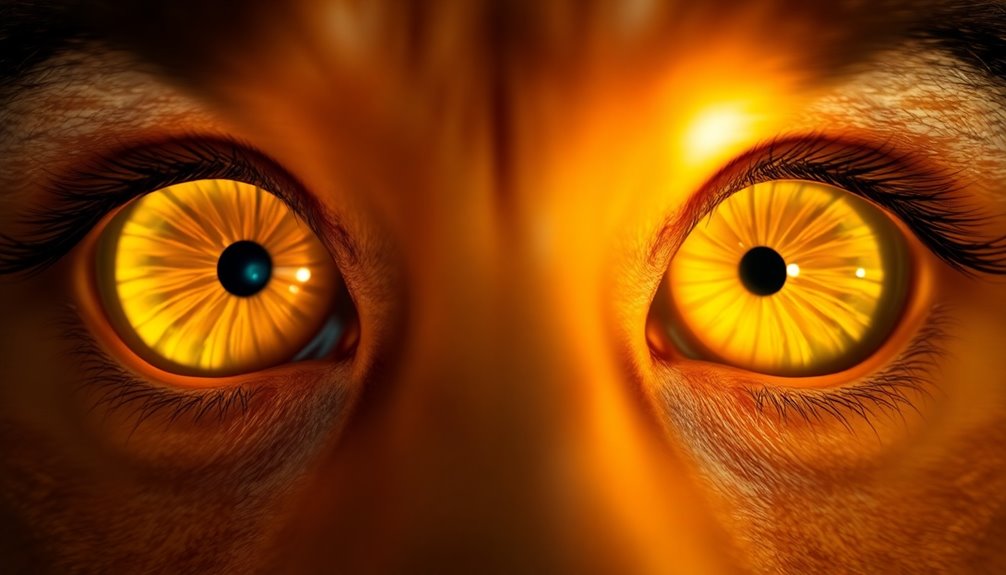
Yellow eyes carry a rich tapestry of symbolism across various cultures and art forms. In Hindu mythology, yellow eyes are a defining trait of Kumbhakama, a figure known for his fierce and intimidating nature. His yellow eyes symbolize power and menace, enhancing his fearsome reputation and making him a formidable presence in the narrative. This striking feature emphasizes the impact of his appearance, marking him as a notable character. Additionally, Kumbhakama's yellow eyes reflect broader themes of power and fear in Hindu mythology, illustrating the complexities of his character.
In Western folklore, yellow eyes often belong to villains, monsters, and supernatural beings, tapping into primal fears. The eerie glow evokes instinctual anxieties, reflecting humanity's fear of the dark unknown. This visual cue, used in classic films like The Wolf Man and Halloween, signifies transformation and corrupted innocence, maximizing dramatic impact with an unsettling intelligence behind them.
In music, the metaphorical use of "yellow eyes" can evoke dreamy qualities, as seen in Rayland Baxter's song. Here, they symbolize a memorable yet fleeting relationship, aligning with broader themes of love and transition.
Thus, yellow eyes resonate deeply across various contexts, representing both menace and allure, bringing forth diverse interpretations that enrich our understanding of their significance.
Cultural Interpretations
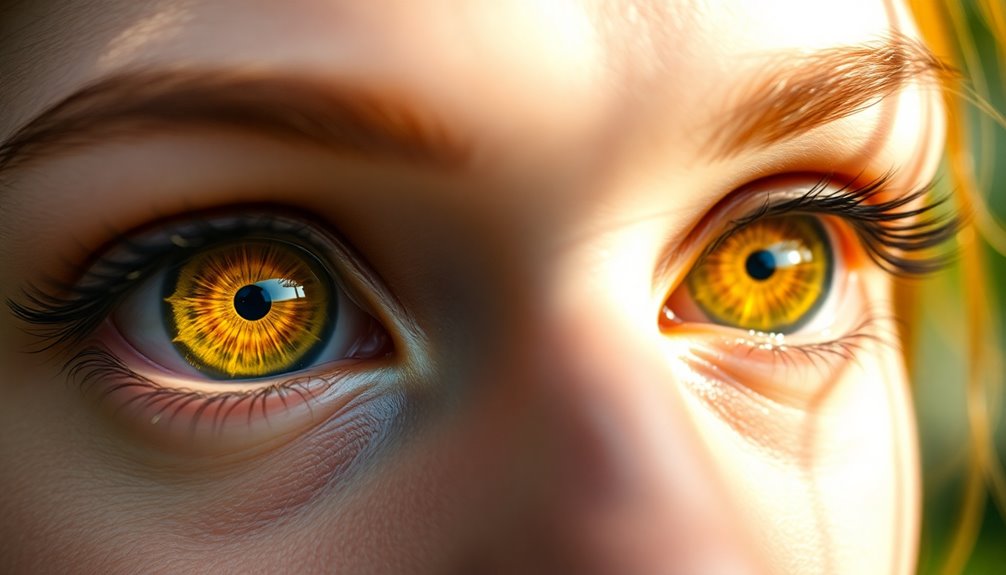
Across cultures, yellow eyes evoke a mix of reverence and fear, often embodying powerful traits in mythology and folklore. In ancient civilizations, they symbolized royalty and divine connection, representing nobility and wealth. Many myths depict yellow eyes as signs of wisdom and vitality, akin to the sun's energy, while in darker narratives, they can signify mysterious or evil characters. The association of yellow eyes with cryptid mysteries highlights the fascination with elusive beings that may possess extraordinary insight, similar to the emotional dysregulation experienced by individuals with certain personality disorders.
In modern media, you'll spot yellow eyes in fantasy works, often associated with magical beings like elves or orcs, enhancing their mystical allure. Cosplay enthusiasts use yellow contact lenses to create memorable characters, tapping into the primal fears these striking eyes evoke. In horror films, yellow eyes hint at complexity or malevolence, instantly signaling to the audience that a character is unusual or threatening.
Culturally, some traditions even involve altering eye color to yellow during ceremonies, seeking divine protection or good fortune. Across West African and Southeast Asian cultures, protective measures involving eyes help ward off malevolent spirits, highlighting the significance of eye symbolism in connecting with supernatural forces. The rarest eye color often enhances the perception of dignity and exceptional qualities in individuals believed to possess yellow eyes.
Thus, yellow eyes resonate deeply, weaving through narratives and practices, bridging the mystical and the everyday.
Psychological Associations
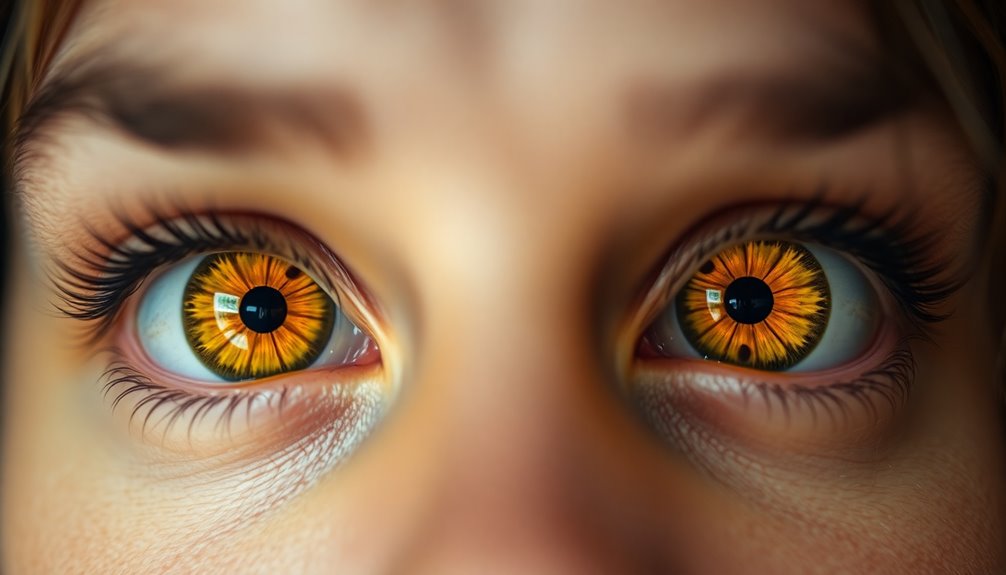
Eyes can reveal much about a person's mental state and emotional well-being. When you observe yellow eyes, they can symbolize intellect, creativity, and energy, reflecting your inner thoughts and mental processes. This vibrant hue may provide the clarity needed for quick decision-making, cutting through mental clutter. You might also associate yellow eyes with optimism and positivity, indicating a cheerful outlook and confidence in your abilities. Additionally, yellow is known to stimulate mental activity, enhancing cognitive functions and enabling better memory retention.
However, it's essential to be aware of the potential downsides. Excessive exposure to yellow can lead to anxiety and emotional fragility, making you feel nervous or agitated. You may notice feelings of being judged or scrutinized, manifesting underlying insecurities. This color can also reflect impulsive tendencies, possibly leading to superficial social interactions.
On the cognitive side, yellow enhances your focus and rational order, promoting high cognitive performance. It allows for innovative thinking, helping you make abstract connections.
Yet, be mindful of its darker associations; yellow can evoke feelings of fear and anxiety in specific contexts, reminding you to navigate your emotional landscape carefully. Recognizing these psychological associations can provide a deeper understanding of your emotional and mental state.
Spiritual Insights
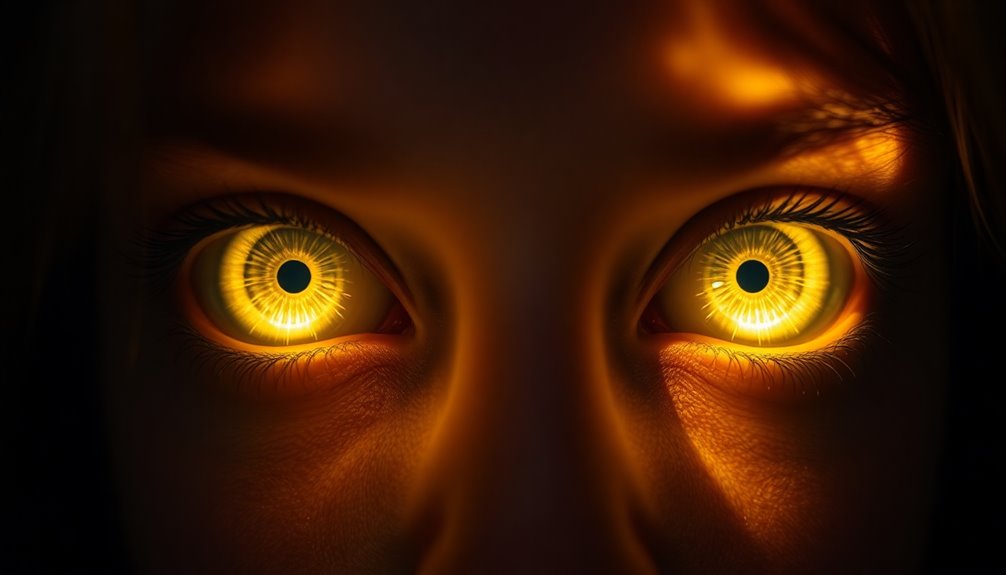
Vision plays a crucial role in understanding spiritual insights, as it reflects your inner state and perspective on life. When you perceive the world through a jaundiced lens, your view tends to be negative, causing you to see flaws everywhere. In contrast, if you cultivate humble eyes, you'll recognize the divine radiance in everyone around you. This shift in perception is essential for spiritual progress.
Pride and ego can cloud your vision, hindering your ability to grow spiritually. Embracing humility and meekness allows you to see clearly and fosters deeper connections with others. By focusing on your own weaknesses rather than judging others, you facilitate your spiritual journey. Gradually recognizing and managing your flaws paves the way for self-improvement and evolution. Additionally, understanding that spiritual growth involves self-reflection rather than judgment of others can further enhance your clarity.
Yellow, symbolizing joy and divine presence, can illuminate your spiritual path. It represents positivity, warmth, and the glory of God. When you align yourself with this light, your mood and behavior can shift toward a more uplifting state.
Ultimately, finding goodness in others and acknowledging their worth is a vital aspect of spiritual growth, reinforcing the importance of humility in nurturing your spiritual insights.
Historical Significance
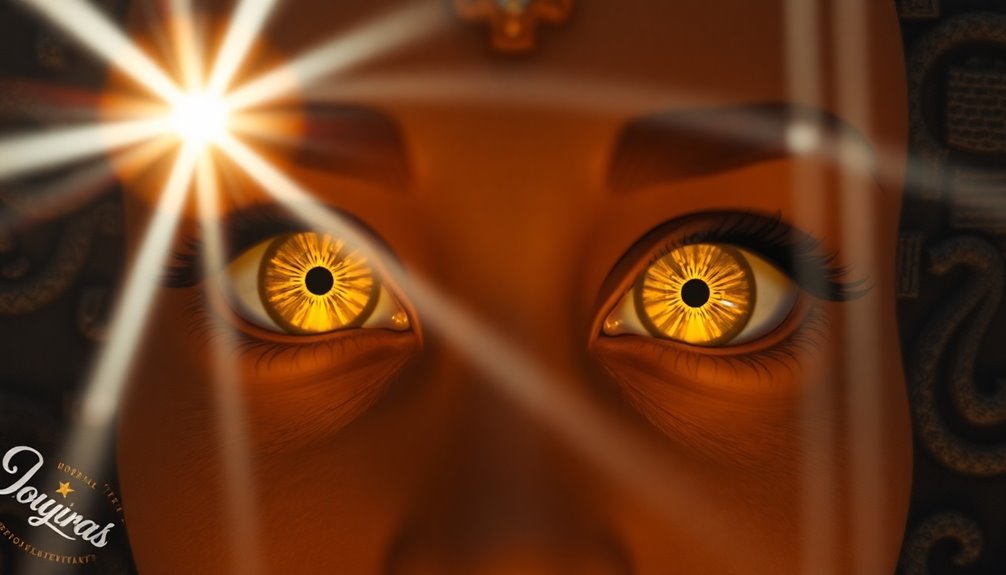
Throughout history, yellow eyes have held significant meaning in various cultures, often serving as symbols of power and insight. In Hindu mythology, for instance, the fierce Kumbhakama is described with striking yellow eyes in the Purana, emphasizing his menacing presence and formidable nature. This distinctive trait marks him as a powerful figure, instilling fear and respect in those who encounter him.
In literature, yellow eyes frequently symbolize deeper themes. They represent insight and awareness, contrasting with blindness that signifies ignorance. Authors use eye symbolism to explore honesty, deceit, and the complexities of human connections. The glowing yellow eyes of nocturnal predators, such as cats and snakes, enhance the innate fear they evoke in humans.
Cinematically, glowing yellow eyes become shorthand for monsters and madness, appearing in classics like The Wolf Man and Halloween. These eyes often characterize villains, tapping into our primal fears of the unknown and embodying transformation and corrupted innocence.
Across cultures, yellow eyes carry varied interpretations. In Western literature, they signify transparency, while in Eastern traditions, they reflect wisdom. In African folklore, the "evil eye" embodies envy and malevolence.
Thus, yellow eyes resonate with universal themes while being rooted in specific cultural contexts.
Animal Connections
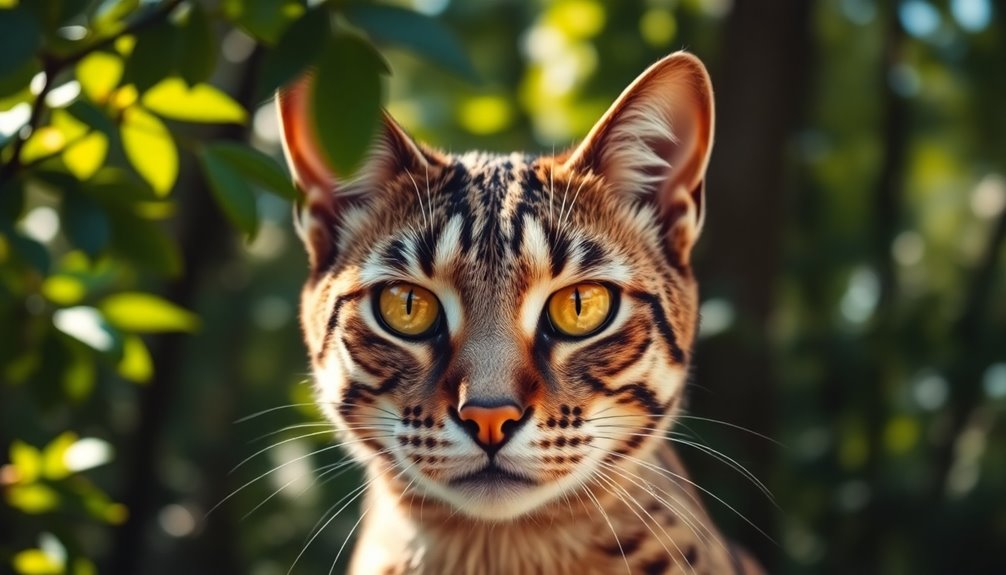
Yellow eyes often evoke strong associations with the animal kingdom, particularly among predators and creatures of the night. When you think of animals like wolves, cats, and snakes, their glowing yellow eyes can stir up feelings of fear and unease. These nocturnal hunters use their keen sight to navigate darkness, embodying a primal instinct that captures your imagination. Interestingly, sonoluminescence has been studied to understand how certain physical phenomena can produce light in dark environments, paralleling the allure of yellow-eyed creatures.
In Navajo legend, the coyote's yellow eyes symbolize both cunning and vulnerability, reflecting the dual nature of many predatory creatures. Their adaptation to low-light conditions showcases survival traits that resonate with you on a deeper level. Additionally, the presence of goldfinches, known for their bright yellow plumage, highlights the contrast of vibrant life amidst the shadows, symbolizing joy and positivity.
The fear instilled by these glowing eyes connects to ancient anxieties about the unknown and potential threats lurking in the shadows. Moreover, yellow eyes often signify more than just predation. They appear in folklore as symbols of malevolence, representing witches, werewolves, and other dark entities.
Yet, in some cultures, they also embody protection and health. As you explore these animal connections, you'll recognize how yellow eyes encapsulate unique qualities, blending fear, adaptability, and the mystical essence of the natural world.
Cinematic Representations
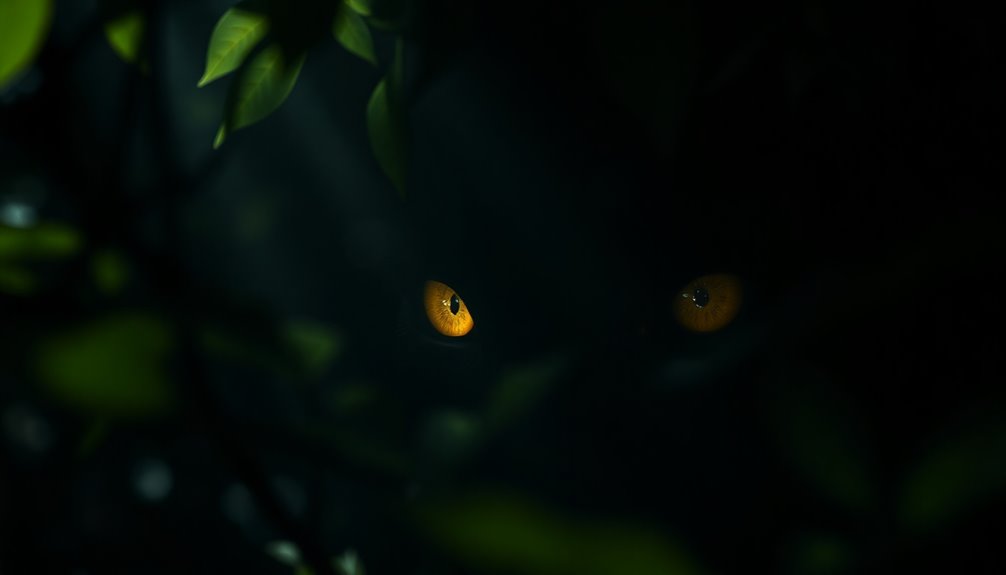
Cinematic representations of yellow eyes tap into a rich tradition of using visual cues to evoke fear and suspense. You'll often find glowing yellow eyes associated with monsters, werewolves, and supernatural beings, making them a staple in classic horror films like _The Wolf Man_ and _Halloween_.
These eyes serve as a shorthand for evil, madness, and malevolent forces, signaling danger even before a character reveals their true nature. The stark contrast of yellow eyes against dark settings amplifies their dramatic impact, capturing your attention and suggesting ill intent. This technique not only guides your understanding of the plot but also engages you to reconsider what you perceive, as representation encompasses thoughts and visual cues that shape your emotional response.
You might notice how filmmakers use yellow eyes to hint at plot twists, cleverly subverting your initial perceptions.
Historically, these representations have evolved yet maintained a consistent symbolism of the unnatural. Advances in technology allow for more vivid portrayals, heightening your emotional response.
As you watch these films, the primal fear they invoke taps into deep-seated anxieties about the unknown, making yellow eyes a powerful tool in the cinematic toolkit of horror storytelling.
Emotional Reactions
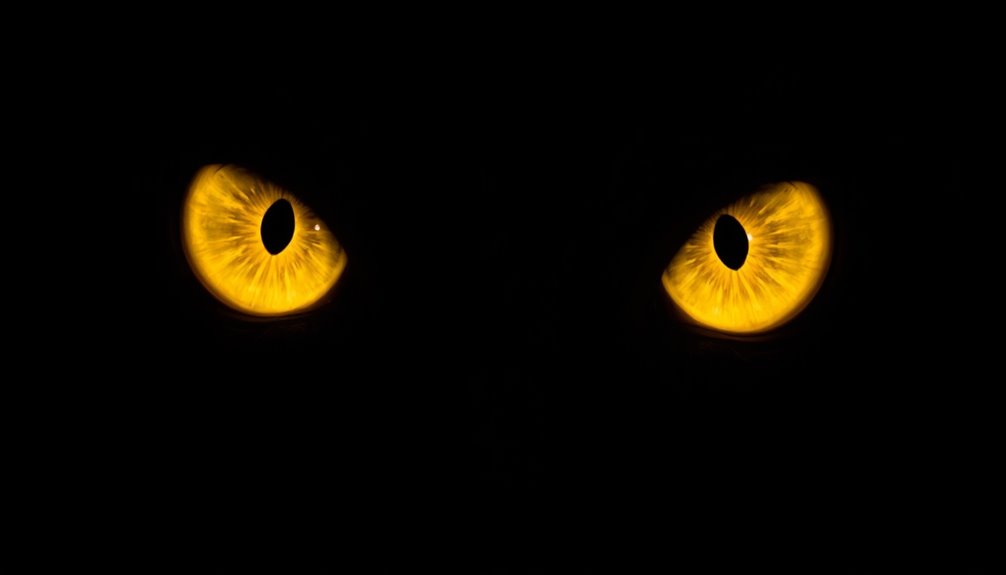
When you encounter yellow eyes, whether in dreams or real life, it can trigger a complex array of emotional reactions. These striking eyes often evoke feelings of vigilance and awareness, signaling hidden dangers or challenges that require your attention. You might feel scrutinized or judged, reflecting insecurities that bubble beneath the surface. This scrutiny can lead to anxiety and fear, pushing you to confront unresolved issues in your waking life.
On a more positive note, yellow eyes may symbolize a new beginning or heightened awareness, sparking optimism about personal growth and spiritual progress. Such experiences often prompt self-reflection, encouraging you to examine the emotions you hold within. You might recognize repressed anger or aggression that needs addressing, or perhaps you'll see this as an invitation to evolve spiritually. Additionally, encountering yellow eyes might resonate with the experience of the Spiritual Eye, reflecting your journey towards higher self-awareness.
In meditation, yellow eyes can resonate with advanced spiritual states, connecting you with a deeper understanding of your ego and higher consciousness. Embracing these emotional reactions allows you to harness their energy for self-improvement.
Ultimately, recognizing and addressing these feelings can lead to transformative insights about yourself and your journey.
Modern Symbolism

Eyes hold significant meaning in modern symbolism, particularly yellow eyes, which often embody associations with malevolence and danger. In films and literature, you'll frequently see characters with glowing yellow eyes portrayed as villains, monsters, or supernatural beings. This visual cue taps into a primal fear of nocturnal predators, suggesting deceit and cowardice while maximizing tension in shadowy settings. Additionally, the unsettling effect of yellow eyes can be likened to the experience of audiometric testing which helps assess one's perception of sound, further emphasizing the importance of perception in understanding danger.
The psychological impact of yellow eyes is profound. They catch your attention, creating an immediate impression of ill intent. You might find this effect enhances the fear and unease, leaving much to your imagination about what lurks in the shadows. Films like "The Wolf Man" and "Halloween" exploit this symbolism effectively, establishing a direct link between yellow eyes and malevolent forces.
Culturally, yellow carries contradictory meanings. While it's associated with divine light in some contexts, it also represents treason and falsity in others. This duality adds depth to its symbolism, allowing you to explore themes of surveillance, identity, and morality. Additionally, eyes symbolize knowledge and perception across various cultures, further enriching their significance in character development and thematic exploration.
In essence, yellow eyes serve as a dramatic representation of danger and insight, reflecting the complexities of human perception and societal judgments.
Transformative Power
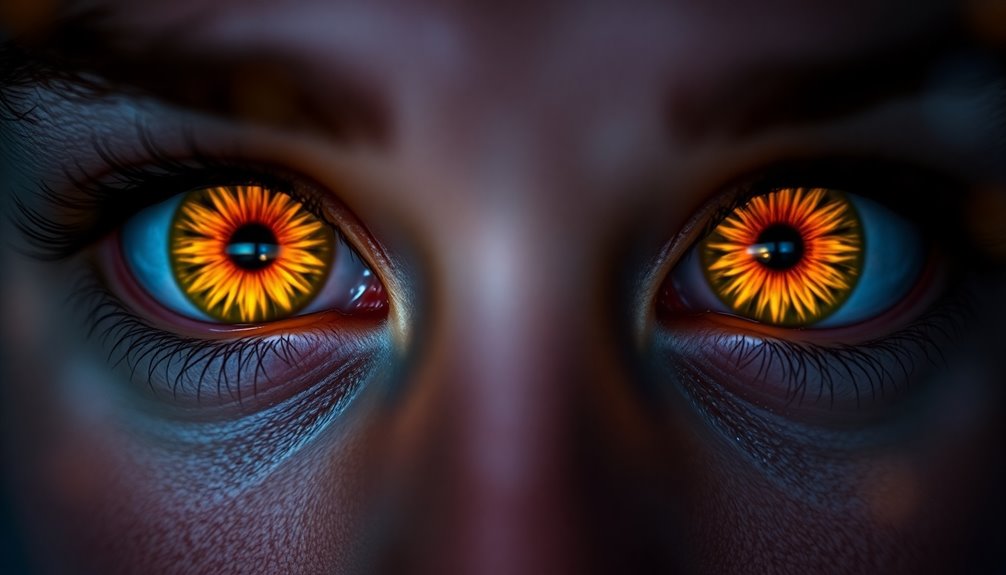
The transformative power of yellow eyes goes beyond mere symbolism; it embodies a journey of personal growth and renewal. When you encounter yellow eyes, they signify new beginnings and hope, encouraging you to embrace change. These eyes remind you that letting go of the old is essential for welcoming new opportunities.
In dreams, yellow eyes often symbolize positive transformation. They guide you through life's complexities, illuminating your path with clarity and comprehension. You're urged to trust your instincts, as these eyes represent your inner wisdom and intuition, lighting the way toward self-realization. Their glowing yellow hue signifies a readiness to shine in darkness, further enhancing your journey. Additionally, engaging in practices like nighttime meditation can deepen your connection to your intuition and personal growth.
Moreover, yellow eyes connect you to immense energy and vitality, radiating warmth and determination. They inspire you to face challenges head-on, embodying a life-affirming presence. As you tap into this powerful energy, you'll find yourself more aligned with your purpose and ready to grow.
Embracing the transformative power of yellow eyes invites you to a higher understanding of your spiritual journey. You're not just seeing; you're experiencing a profound awakening that invites renewal and growth in every aspect of your life.
Frequently Asked Questions
Can Yellow Eyes Indicate Physical Health Issues in Humans?
Yes, yellow eyes can indicate physical health issues in humans. When you notice a yellowing of the sclera, it often points to elevated bilirubin levels, which can result from liver disease, blocked bile ducts, or blood disorders.
Other symptoms may include yellow skin, dark urine, and abdominal pain. If you observe these signs, it's important to consult a healthcare provider to identify and address the underlying cause effectively.
How Do Yellow Eyes Appear in Different Lighting Conditions?
When you observe yellow eyes in different lighting conditions, you'll notice variations in hue and intensity.
In bright light, the yellow may appear more vivid, while in dim light, it can seem muted or even blend with the surrounding sclera.
Reflections can also alter perception, making the yellow more prominent or less noticeable depending on your angle and the light source.
Always consider environmental factors, as they play a significant role in how you perceive color.
Are Yellow Eyes Linked to Certain Personality Traits?
Yellow eyes aren't commonly analyzed for specific personality traits like other eye colors.
However, if you have yellow eyes, you might be perceived as unique, intriguing, and vibrant. People may see you as someone who's passionate and full of energy.
You likely stand out in a crowd and can evoke curiosity in others. While there's no established link, your yellow eyes could suggest a boldness and confidence that draws people in.
Do Animals Perceive Yellow Eyes Differently Than Humans?
Animals do perceive yellow eyes differently than you do.
While you might see yellow as just a color, many animals relate it to their night vision and hunting instincts.
For instance, predators with yellow eyes have a reflective layer in their eyes that enhances how they see in low light.
This adaptation helps them navigate their environment, which means their perception of yellow is tied more to survival than aesthetics.
Can Yellow Eyes Change Color Based on Emotions?
Yes, yellow eyes can change color based on emotions. When you experience intense feelings like happiness or anger, your pupils dilate or constrict, affecting how light interacts with your eyes.
This can enhance or mute the yellow hue, making it appear different. Additionally, environmental factors like lighting play a role.
Conclusion
In exploring the spiritual meaning of yellow eyes, you uncover a rich tapestry of symbolism and insight. Whether it's the illuminating gaze that reveals hidden truths or the transformative power it holds, these interpretations invite you to reflect on your own perceptions. Embrace the unique qualities of yellow eyes, allowing their vibrant energy to inspire your journey toward self-discovery and deeper understanding. Remember, every glance can be a doorway to new spiritual insights waiting to be revealed.

